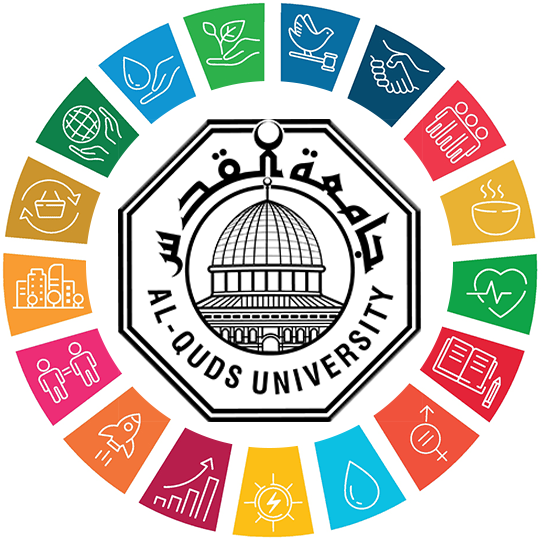I. Introduction
Research plays a crucial role in addressing climate change by generating new knowledge, innovative solutions, and fostering collaboration across disciplines. This Climate Action Plan outlines SMART (Specific, Measurable, Achievable, Relevant, and Time-bound) objectives for the research area at Al-Quds University, focusing on promoting and supporting sustainability and climate action research across campus.
II. SMART Objectives for Climate Action in Research
A. Interdisciplinary Research Collaborations
- Specific: Establish five interdisciplinary research collaborations focused on climate action and sustainability.
- Measurable: Track the number of interdisciplinary research collaborations and their outcomes.
- Achievable: Create opportunities for faculty and students from different disciplines to collaborate on sustainability and climate action research projects, such as joint workshops, seminars, and grant applications.
- Relevant: Interdisciplinary research collaborations foster innovative solutions to complex environmental challenges.
- Time-bound: Establish the targeted number of research collaborations within five years.
B. Research Funding and Support
- Specific: Increase funding for sustainability and climate action research projects by 30%.
- Measurable: Monitor the amount of funding allocated to sustainability and climate action research projects.
- Achievable: Develop funding strategies and resources to support climate action research, such as dedicated grant programs, internal funding, and partnerships with external organizations.
- Relevant: Increased funding supports the growth and impact of sustainability and climate action research at the university.
- Time-bound: Achieve the targeted increase in research funding within four years.
C. Research Output and Impact
- Specific: Increase the publication of sustainability and climate action research by 20%.
- Measurable: Track the number of research papers, presentations, and other research outputs related to sustainability and climate action.
- Achievable: Provide resources and support for faculty and students to publish and disseminate their research, such as workshops on research writing and presentation skills, and financial support for conference participation.
- Relevant: Increased research output in sustainability and climate action contributes to the advancement of knowledge and the development of innovative solutions.
- Time-bound: Achieve the targeted increase in research output within four years.
D. Research-to-Practice Transfer
- Specific: Implement at least three research-to-practice projects that translate sustainability and climate action research findings into practical solutions on campus or in the community.
- Measurable: Monitor the number of research-to-practice projects and their outcomes.
- Achievable: Encourage and support faculty and students to develop research-to-practice projects, such as pilot programs, policy recommendations, and community engagement initiatives.
- Relevant: Translating research findings into practice helps address climate change and sustainability challenges at the local level.
- Time-bound: Implement the targeted number of research-to-practice projects within five years.
E. Research Visibility and Recognition
- Specific: Increase the visibility and recognition of sustainability and climate action research at Al-Quds University by 25%.
- Measurable: Track media coverage, citations, and other indicators of research visibility and recognition.
- Achievable: Promote research achievements through the university website, social media, newsletters, and other communication channels, and support faculty and students in showcasing their research at conferences and events.
- Relevant: Enhancing the visibility and recognition of sustainability and climate action research raises awareness of the university’s research efforts and attracts external funding and partnerships.
- Time-bound: Achieve the targeted increase in research visibility and recognition within four years.
III. Implementation and Monitoring
A. Climate Action Research Committee
- Establish a Climate Action Research Committee, comprising representatives from various university departments and stakeholder groups, to oversee the implementation and monitoring of the Climate Action Plan in the research area. and assigning a specific responsibilities and tasks to committee members related to the various SMART objectives outlined in the plan.
- Hold regular meetings to review progress, discuss challenges, and plan future actions related to the Climate Action Plan in the research area.
B. Collaboration and Engagement
- Foster collaboration between students, faculty, staff, and the broader research community to achieve the plan’s objectives.
- Encourage input and feedback from various stakeholders on the implementation and progress of the Climate Action Plan in the research area.
- Develop partnerships with local organizations, research institutions, and governments to share resources, knowledge, and best practices related to climate action and sustainability research.
C. Capacity Building and Training
- Provide training and capacity-building programs to university staff, faculty, and students to ensure they have the necessary skills and knowledge to implement the Climate Action Plan effectively in the research area.
- Develop educational materials and resources related to research methodologies, data analysis, and other relevant topics for use in sustainability and climate action research projects.
D. Monitoring and Reporting
- Establish a system for tracking progress towards the SMART objectives, including regular data collection, analysis, and reporting.
- Conduct periodic reviews of the Climate Action Plan to assess progress, identify areas for improvement, and make necessary adjustments to the plan.
- Publish annual progress reports on the university’s climate action initiatives in the research area, detailing achievements, challenges, and future plans.
The Climate Action Plan with SMART objectives in the research area at Al-Quds University demonstrates the institution’s commitment to addressing climate change and promoting environmental sustainability through research. By focusing on specific, measurable, achievable, relevant, and time-bound objectives, the university can effectively monitor progress and ensure that its climate action efforts in research are on track. Through collaboration, engagement, capacity building, and regular monitoring and reporting, Al-Quds University aims to contribute to the global effort to combat climate change and create a more sustainable future.
